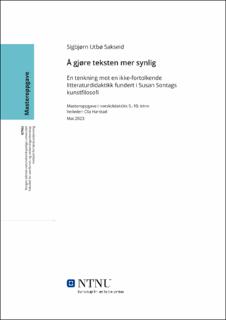| dc.contributor.advisor | Ola Harstad | |
| dc.contributor.author | Sigbjørn Utbø Sakseid | |
| dc.date.accessioned | 2023-07-18T17:22:09Z | |
| dc.date.available | 2023-07-18T17:22:09Z | |
| dc.date.issued | 2023 | |
| dc.identifier | no.ntnu:inspera:143756085:22869348 | |
| dc.identifier.uri | https://hdl.handle.net/11250/3080095 | |
| dc.description.abstract | Denne oppgaven problematiserer fortolkning som en grunnleggende antakelse i litteraturundervisningen. Det vil si tanken om at det i litteraturundervisning finnes en forståelse om at alle tekster skal fortolkes. Dette kan problematiseres på bakgrunn av at det finnes muligheter hvor ulike former for fortolkningspraksiser kan gjøre at man mister synet av hva som faktisk står i teksten. Det som da kan skje er at det i mindre grad legges opp til litterære opplevelser, noe som igjen gjør at det etiske aspektet som kan ligge i litteraturundervisningen da ikke blir oppfylt.
Grunnlaget for denne problematiseringen henter jeg fra den amerikanske kulturkritikeren og filosofen Susan Sontag (1933–2004), som i sin kunstfilosofi legger opp til at når man fortolker et kunstverk bytter man ut det man faktisk ser til fordel for en påstått bakenforliggende mening, og slik reduseres verket til en meningsytring fremfor noe som har potensialet til å virke i oss.
Ved å først gå gjennom hvordan man kan forstå fortolkning som en grunnleggende antakelse, både gjennom litteraturteori, empiri fra tidligere forskning og gjennom dagens læreplan tar jeg videre for meg hvordan dette kan spille seg negativt ut, i form av en manglende mulighet for å legge til rette for litterære opplevelser. Deretter tenker jeg med Sontags kunstfilosofi for å kunne formulere en alternativ, ikke-fortolkende litteraturdidaktikk som setter teksten, og leserens opplevelse av den faktiske teksten, i fokus. Jeg finner her at de mest problematiske formene for fortolkning, og som i en Sontag-inspirert undervisning er de som kan kalles objektiverende fortolkninger, som tar høyde for at det finnes en objektiv helhet i verket som skal «gå opp», i tillegg til de fortolkningene som antar at det finnes et budskap man kan tolke seg frem til. Det vil da si at det ikke er fortolkningspraksis i seg selv som forhindrer muligheten for å legge til rette for litterære opplevelser, men heller ferdigformulerte fortolkningsmetoder som brukes på alle tekster.
Avslutningsvis vil jeg drøfte hvordan en Sontag-inspirert litteraturdidaktikk besvarer spørsmålene hva, hvordan og hvorfor. Det vil si grunnleggende litteraturdidaktiske spørsmål som hva skal man lese, hvordan skal man arbeide med disse tekstene og hvorfor skal man arbeide slik med disse tekstene. | |
| dc.description.abstract | This Master’s thesis problematizes interpretation as a fundamental assumption in literature education. This means that there is a notion that all texts should be interpreted. This notion can be problematized through an idea that different forms of interpretive practices can lead to a loss of focus on what the text actually says, reducing the potential for literary experiences and failing to fulfill the ethical aspect of literature education.
The basis for this critique is drawn from the American cultural critic and philosopher Susan Sontag, whose philosophy of art suggests that interpreting an artwork replaces the actual visual experience with a presumed underlying meaning, thus reducing the work to a statement of meaning rather than something that has the potential to affect us.
By exploring how interpretation can be understood as a fundamental assumption, drawing on literary theory, empirical research, and current curriculum guidelines, this thesis examines the possible negative consequences of this approach connected to limiting the opportunities for literary experiences. I then use Sontag's philosophy of art to propose an alternative, non-interpretive approach to literature didactics that focus on the text itself and the reader's experience of the actual text. I identify two forms of interpretive methods as the most problematic, namely objectifying interpretations, which assume that there is an objective whole in the work that can be deciphered, and interpretations that presume that there is a message in the text. In the end I find that it is not interpretation as a practice itself that hinders the possibility of facilitating literary experiences, but rather the application of preconceived interpretive methods to all texts.
In conclusion, I discuss the didactic considerations associated with a Sontag-inspired literature didactics, addressing fundamental questions of what to read, how to work with these texts, and why one should engage with them in such a manner. | |
| dc.language | nob | |
| dc.publisher | NTNU | |
| dc.title | Å gjøre teksten mer synlig. En tenkning mot en ikke-fortolkende litteraturdidaktikk fundert i Susan Sontags kunstfilosofi. | |
| dc.type | Master thesis | |
